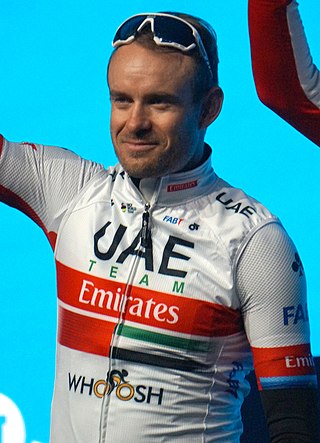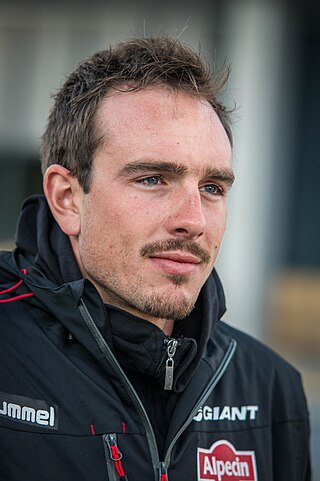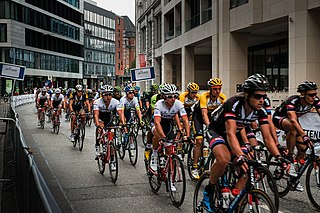
Tom Boonen is a Belgian former road bicycle racer, who competed as a professional between 2002 and 2017 for the U.S. Postal Service and Quick-Step Floors teams and a professional racing driver who currently competes in Belcar, having previously competed in the NASCAR Whelen Euro Series. Boonen won the 2005 UCI World Road Race Championships, and was a single-day road specialist with a strong finishing sprint. He won the cycling monuments Paris–Roubaix 4 times and the Tour of Flanders 3 times, among many other prestigious victories, such as prevailing 5 times in the E3 Harelbeke, winning 6 stages of the Tour de France and winning the Overall title of the Tour of Qatar 4 times.

Mark Simon Cavendish is a British professional road racing cyclist from the Isle of Man who rides for UCI WorldTeam Astana Qazaqstan Team. As a track cyclist he specialises in the madison, points race, and scratch race disciplines; as a road racer he is a sprinter. He is widely considered one of the greatest road sprinters of all time, and in 2021 was called "the greatest sprinter in the history of the Tour and of cycling" by Christian Prudhomme, director of the Tour de France.

Greg Van Avermaet is a Belgian professional cyclist, who currently rides for UCI WorldTeam AG2R Citroën Team. Considered one of the most versatile riders of modern cycling, Van Avermaet is a specialist of the classic cycle races, but has also won stages and the general classification in stage races, particularly when run on a hilly terrain, such as the 2016 Tirreno–Adriatico, and the 2018 Tour de Yorkshire. His strong sprint finish enables him to win sprints of small lead groups, but he has also won races after solo breakaways.

Edvald Boasson Hagen is a Norwegian professional road racing cyclist, who rides for UCI ProTeam Team TotalEnergies. He was ranked as no. 3 in the world by UCI as of 31 August 2009, when he was 22 years old. He is known as an all-rounder, having won the Norwegian National Road Race Championships in 2012, 2015 and 2016. He is also a ten-time winner of the Norwegian National Time Trial Championships.

Alexander Kristoff is a Norwegian professional road bicycle racer, who currently rides for UCI ProTeam Uno-X Pro Cycling Team. He won the Norwegian National Road Race Championships in 2007 and 2011. His biggest victories have been the 2014 Milan–San Remo and the 2015 Tour of Flanders among many other successes.

Peter Sagan is a Slovak professional road bicycle racer who currently rides for UCI ProTeam Team TotalEnergies. Sagan had a successful junior cyclo-cross and mountain bike racing career, winning the junior cross-country race at the 2008 UCI Mountain Bike & Trials World Championships, before moving to road racing.

John Degenkolb is a German professional road bicycle racer, who currently rides for UCI WorldTeam Team DSM. His biggest wins to date are the 2015 Milan–San Remo and the 2015 Paris–Roubaix, two of cycling's five monuments. He is a winner of stages in all three Grand Tours, with ten stages and the points classification at the Vuelta a España, one stage of the Giro d'Italia, and one stage in the Tour de France.
The 2016 UCI Road World Championships took place in Doha, Qatar, in October 2016. The championships was moved from the traditional September to October to avoid extreme hot and blustery weather. The event consisted of a road race, a team time trial and a time trial for elite men and women and a road race and a time trial for men under-23, junior men and junior women. It was the 89th Road World Championships and the first time that Qatar and the Middle East hosted the championships.

The 2016 Tour de France was the 103rd edition of the Tour de France, one of cycling's Grand Tours. The 3,529 km (2,193 mi)-long race consisted of 21 stages, starting on 2 July in Mont Saint-Michel, Normandy, and concluding on 24 July with the Champs-Élysées stage in Paris. A total of 198 riders from 22 teams entered the race. The overall general classification was won by Chris Froome of Team Sky, with the second and third places were taken by Romain Bardet and Nairo Quintana, respectively.

The 2015 Milan–San Remo was a one-day cycling classic that took place in Italy on 22 March. The race was the 106th edition of the Milan–San Remo. It was the fourth of the 28 races on the Union Cycliste Internationale's (UCI) 2015 World Tour and the first of them to be a one-day race. It was also the first of the 2015 cycling monuments, the five most important one-day races of the year. The defending champion was Alexander Kristoff, who won the previous year's race in a sprint.

The 2015 Tour of Flanders was the 99th edition of the Tour of Flanders one-day cycling race. It took place on 5 April and was the eighth race of the 2015 UCI World Tour. The race was one of the cobbled classics and was the second of the cycling monuments on the 2015 calendar. The 2014 champion was Fabian Cancellara; he was not able to defend his title after breaking two vertebrae in a crash at E3 Harelbeke.

The 2015 Tour of Qatar was the 14th edition of the Tour of Qatar cycling stage race. It was organised by the Amaury Sport Organisation (ASO), the organisers of the Tour de France. The race was rated as a 2.HC event, the second highest rating an event can receive, and was part of the 2015 UCI Asia Tour.

The 2015 Vattenfall Cyclassics was a one-day classic cycling race that took place in Northern Germany on 23 August. It was the 20th edition of the Vattenfall Cyclassics one-day cycling race, and was the twenty-third race of the 2015 UCI World Tour. The race started in Kiel and ended in Hamburg. The course was mainly flat; the race generally suits sprinters, such as the defending champion, Alexander Kristoff.
The 2016 Gent–Wevelgem, was a one-day cycling classic that took place on 27 March 2016. It was the 78th edition of the Gent–Wevelgem race and the seventh event of the 2016 UCI World Tour. The race followed a 243-kilometre (151 mi) course that started in Deinze and ended in Wevelgem in Belgium, with a portion of the race spent in northern France. The race included ten climbs, several of them cobbled, which provided the principal difficulty in the race. The last and most difficult climb was the Kemmelberg. The favourites for the race included Alexander Kristoff, Fabian Cancellara (Trek–Segafredo), and Peter Sagan (Tinkoff).

2016 in men's road cycling is about the 2016 men's bicycle races governed by the UCI.

The Women's road race of the 2016 UCI Road World Championships took place in and around Doha, Qatar on 15 October 2016. The course of the race was 134.1 km (83.3 mi) with the start and finish in Doha. Lizzie Deignan was the defending champion, having won the world title in 2015. Deignan was unable to defend her title, as she finished fourth in the bunch sprint finish.

2017 in men's road cycling is about the 2017 men's bicycle races governed by the UCI.

The Men's road race of the 2017 UCI Road World Championships was a cycling event that took place on 24 September 2017 in Bergen, Norway. It was the 84th edition of the championship, and Slovakia's Peter Sagan was the two times defending champion.

The Men's road race of the 2018 UCI Road World Championships was a cycling event that took place on 30 September 2018 in Innsbruck, Austria. It was the 85th edition of the championship, and Slovakia's Peter Sagan was the three times defending champion, a record in the event. 188 riders from 44 nations entered the competition.
















